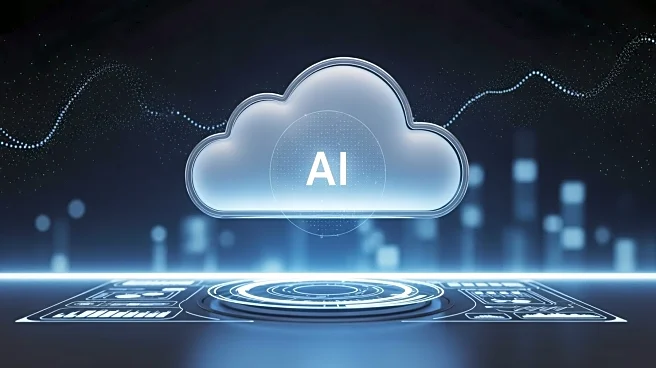What's Happening?
Gary Wiessinger, Senior Vice President of Application Development at Oracle, emphasized the importance of a balanced approach to integrating artificial intelligence (AI) in cloud enterprise resource planning
(ERP) systems. Speaking at SuiteWorld in Las Vegas, Wiessinger cautioned against the risks of over-customization and stressed the need for structured oversight combined with grassroots innovation. He highlighted the transformative potential of agentic AI, where autonomous AI agents collaborate with humans to automate workflows, thereby enhancing decision-making and operational efficiency. Wiessinger pointed out that many firms struggle with finding the right strategy, often oscillating between centralized and decentralized approaches. He advocated for identifying high-impact tasks for automation while encouraging controlled employee innovation.
Why It's Important?
The integration of AI into cloud ERP systems is crucial for businesses aiming to improve operational efficiency and decision-making processes. Wiessinger's insights are significant as they address common pitfalls such as over-customization, which can hinder scalability and performance. By promoting a balanced approach, Oracle aims to help companies leverage AI effectively, potentially leading to increased productivity and competitive advantage. The emphasis on agentic AI suggests a shift towards more collaborative and automated business processes, which could redefine enterprise execution in the coming years. Companies that successfully implement these strategies may gain a significant edge in the rapidly evolving digital landscape.
What's Next?
As AI integration in cloud ERP systems deepens, companies are expected to focus on balancing flexibility, intentionality, and innovation. Oracle's SuiteSuccess program, which helps customers apply best practices and determine appropriate customization levels, will likely play a key role in guiding firms through this transition. Businesses may need to reassess their change management strategies to avoid replicating legacy systems and instead design processes that align with desired business outcomes. The evolution of agentic AI could lead to more automated workflows, requiring firms to adapt their operational models to fully harness AI's potential.
Beyond the Headlines
The adoption of agentic AI in cloud ERP systems raises ethical and cultural considerations, particularly regarding the role of human oversight in automated processes. As AI agents become more autonomous, companies must navigate the balance between human control and machine efficiency. This shift could also impact workforce dynamics, necessitating new skills and training for employees to work alongside AI systems. Long-term, the integration of AI in business processes may lead to significant changes in organizational structures and decision-making hierarchies.









